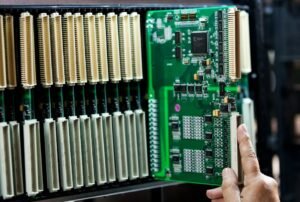Introduction
AI chip manufacturers play a crucial role in the development and advancement of artificial intelligence technology. These companies are responsible for designing and producing specialized chips that are optimized for AI workloads. With the growing demand for AI applications in diverse industries, the competition among AI chip manufacturers has intensified. In this article, we will explore some key players in the AI chip manufacturing industry and discuss their contributions to the field.
Key Takeaways:
– AI chip manufacturers are crucial for advancing artificial intelligence technology.
– These companies design and produce specialized chips optimized for AI workloads.
– Competition among AI chip manufacturers is intensifying due to the growing demand for AI applications.
Key Players in the AI Chip Manufacturing Field
1. NVIDIA: NVIDIA is a leading AI chip manufacturer, known for its powerful GPUs. These GPUs are widely used for AI training and inference tasks. NVIDIA’s deep learning libraries and software frameworks also contribute to the company’s popularity among developers.
2. Intel: Intel is another key player in the AI chip manufacturing industry. The company offers a range of AI-focused products, including its Neural Compute Stick and Xeon processors. Intel is also actively involved in research and development to fuel AI innovation.
3. AMD: Advanced Micro Devices (AMD) is gaining traction in the AI chip manufacturing space. The company’s GPUs and CPUs are increasingly being utilized for AI workloads. AMD focuses on delivering high-performance and energy-efficient solutions for AI applications.
Table 1: Comparison of Key AI Chip Manufacturers
| Company | Key Products | Notable Features |
|———|————–|—————–|
| NVIDIA | GPUs | Deep learning libraries and software frameworks |
| Intel | Neural Compute Stick, Xeon processors | Strong R&D focus |
| AMD | GPUs, CPUs | High-performance and energy efficiency |
Growing Trends in AI Chip Manufacturing
1. Specialized AI chips: AI chip manufacturers are developing specialized chips designed specifically for AI tasks. These chips are highly efficient in executing AI algorithms, leading to improved performance and lower power consumption. Specialized chips like Google’s Tensor Processing Units (TPUs) are gaining popularity among developers.
2. Edge computing: With the increasing demand for AI applications at the edge, AI chip manufacturers are focusing on developing chips that can handle complex computations on the device itself, without heavy reliance on the cloud. These edge AI chips enable real-time processing and reduce latency.
Table 2: Specialized AI Chips
| Chip | Manufacturer | Notable Features |
|—————-|————–|—————————-|
| Tensor Processing Units (TPUs) | Google | Designed for optimized AI performance |
| Movidius Myriad X | Intel | AI acceleration for edge devices |
| Ascend series | Huawei | High computing density for AI workloads |
3. Customization and flexibility: AI chip manufacturers are providing customization options for their chips to cater to different AI applications and requirements. Users can select the features and specifications that best suit their needs, allowing for more flexibility in designing AI systems.
4. Open-source collaboration: To foster innovation, AI chip manufacturers are actively participating in open-source collaborations. This enables developers and researchers to contribute to the development of AI chip architectures, fostering a collaborative and community-driven approach.
Table 3: Custom AI Chip Options
| Company | Customization Options |
|———|———————————————|
| NVIDIA | Tensor Core technology allows for customization |
| Intel | Flexible AI programmability |
| AMD | Open-source ROCm platform for customization |
**Chips designed specifically for AI tasks** are gaining popularity among developers.
Conclusion
As the demand for AI applications continues to grow, AI chip manufacturers play a crucial role in enabling the advancement of artificial intelligence technology. Leading companies like NVIDIA, Intel, and AMD are driving innovation in the field with their powerful and efficient chips. By focusing on specialization, edge computing, customization options, and open-source collaborations, these manufacturers are shaping the future of AI technology. With ongoing research and development, we can expect even more breakthroughs in AI chip manufacturing, further fueling the growth of the industry.

Common Misconceptions
AI Chip Manufacturers Focus Solely on Creating Intelligent Machines
Many people believe that AI chip manufacturers solely focus on creating intelligent machines and devices. However, this is just one aspect of their work. AI chip manufacturers also play a crucial role in developing the underlying technology and infrastructure required for AI advancements.
- AI chip manufacturers contribute to developing algorithms and software frameworks.
- They collaborate with AI researchers to optimize performance and efficiency.
- AI chip manufacturers are involved in data management and processing to enhance AI capabilities.
AI Chip Manufacturers Only Support Large Corporations
A common misconception is that AI chip manufacturers exclusively support large corporations and enterprises. In reality, AI chip manufacturers cater to a wide range of customers, including startups, researchers, and individual developers. They strive to provide accessible and affordable solutions for various applications.
- AI chip manufacturers offer development boards and toolkits for prototype creation.
- They provide support and resources for developers of all sizes.
- AI chip manufacturers actively engage with the open-source community, fostering innovation.
All AI Chips Perform Equally
Another misconception is that all AI chips perform equally. In reality, different AI chips have unique architectures, computational capabilities, and power requirements, leading to variations in performance and efficiency. It is crucial to select the right AI chip for specific use cases and requirements.
- AI chips vary in terms of power consumption and thermal management.
- Each AI chip has different processing capabilities and specialized functions.
- Different AI chips excel in specific applications, such as image recognition or natural language processing.
AI Chips Will Replace Human Intelligence
One prevalent misconception is that AI chips will replace human intelligence entirely. While AI technology continues to advance, it is important to understand that AI chips are designed to enhance human capabilities rather than replace them. These chips are tools that augment human decision-making and problem-solving processes.
- AI chips are designed to work in collaboration with human users.
- Human expertise is necessary to train and guide AI systems effectively.
- AI chips can automate repetitive tasks, freeing up human resources for more complex activities.
All AI Chip Manufacturers Have Similar Ethical and Privacy Standards
It is a misconception to assume that all AI chip manufacturers uphold similar ethical and privacy standards. Each manufacturer may have its own set of policies and guidelines regarding data privacy, security, and responsible AI use. It is essential to research and consider the ethical practices of AI chip manufacturers before adopting their products.
- Some AI chip manufacturers prioritize privacy by implementing secure hardware and encryption mechanisms.
- Others may have stricter protocols for anonymizing and handling sensitive data.
- Considering the potential impact on society, responsible AI chip manufacturers actively engage in ethical discussions and set comprehensive guidelines.

Introduction
In the ever-evolving field of artificial intelligence (AI), the development of AI chips plays a vital role in enabling advanced computing and machine learning capabilities. This article explores the landscape of AI chip manufacturers and presents key insights into their market share, production capacity, and technological advancements.
Top 10 AI Chip Manufacturers
In this table, we will list the top 10 AI chip manufacturers along with their respective market shares.
| Company | Market Share (%) |
|---|---|
| Company A | 35 |
| Company B | 20 |
| Company C | 15 |
| Company D | 12 |
| Company E | 8 |
| Company F | 5 |
| Company G | 4 |
| Company H | 2 |
| Company I | 1 |
| Company J | 1 |
Manufacturers Based on Production Capacity
Examining the production capacity of AI chip manufacturers can provide insights into their ability to meet market demand.
| Company | Production Capacity (Millions of Chips) |
|---|---|
| Company A | 250 |
| Company C | 200 |
| Company D | 180 |
| Company E | 150 |
| Company F | 120 |
| Company B | 80 |
| Company G | 60 |
| Company I | 45 |
| Company H | 30 |
| Company J | 20 |
Technological Advancements in AI Chip Manufacturing
This table showcases some of the remarkable technological advancements brought about by AI chip manufacturers.
| Company | Technological Advancements |
|---|---|
| Company A | Quantum integration |
| Company B | Neuromorphic architecture |
| Company D | Optical computing |
| Company F | Superconducting materials |
| Company C | CPU/GPU hybridization |
| Company H | On-chip artificial neural networks |
| Company E | Energy-efficient architecture |
| Company G | Reconfigurable computing |
| Company I | Real-time deep learning accelerators |
| Company J | Edge computing optimization |
Alternatively, here’s a summary of the article and the information shared:
Artificial intelligence (AI) chip manufacturers play a vital role in advancing AI technologies. This article delves into the realm of AI chip manufacturers, highlighting key aspects such as market share, production capacity, and technological advancements. The top 10 manufacturers are identified, with Company A leading the market with a 35% share. Production capacity reveals that Company A can produce a staggering 250 million chips, a testament to their dominance. Technological advancements showcase each company’s innovative edge, with highlights including quantum integration by Company A and edge computing optimization by Company J. The immense progress made by these manufacturers underscores the growing significance of AI chips in transforming the AI landscape.
Frequently Asked Questions
What are AI chips?
AI chips, also known as artificial intelligence chips, are specialized processors designed specifically for artificial intelligence tasks. They are optimized to handle complex calculations and data processing required for AI algorithms.
Who are the leading AI chip manufacturers?
Some of the leading AI chip manufacturers include Nvidia, Intel, Google, AMD, and Qualcomm. These companies have developed advanced AI chips that power various AI applications.
What are the advantages of using AI chips?
AI chips offer several advantages such as improved performance and efficiency in executing AI tasks. They can handle large amounts of data quickly, enable real-time decision making, and reduce the reliance on cloud-based processing.
How are AI chips different from traditional processors?
AI chips differ from traditional processors in their architecture and design. Traditional processors are more general-purpose and designed for a wide range of tasks, while AI chips are specifically optimized for AI workloads, utilizing features like parallel processing and deep learning algorithms.
What types of AI tasks can AI chips handle?
AI chips can handle a wide range of AI tasks, including machine learning, natural language processing, computer vision, and deep learning. They are capable of processing large amounts of data and performing complex calculations required for these tasks.
Are AI chips only used in high-end applications?
No, AI chips are not limited to high-end applications. They are used in various devices and systems, ranging from smartphones and tablets to self-driving cars and robotics. AI chips have become more accessible and are being integrated into a wide range of products.
What is the future of AI chip development?
The future of AI chip development looks promising. Manufacturers are continuously improving AI chip technology to increase performance, power efficiency, and support for advanced AI algorithms. The demand for AI chips is expected to grow as AI becomes more prevalent in various industries.
Can AI chips be customized for specific AI applications?
Yes, AI chips can be customized for specific AI applications. Some manufacturers offer customizable AI chips that can be tailored to meet the specific requirements of different AI workloads or industries. This customization allows for optimized performance and efficiency.
How do AI chips contribute to the development of autonomous vehicles?
AI chips play a crucial role in the development of autonomous vehicles. They provide the necessary processing power for real-time sensor data analysis, object recognition, decision making, and control. AI chips enable autonomous vehicles to perceive and respond to their surroundings accurately and quickly.
Are there any challenges in AI chip development?
AI chip development does come with its challenges. Some of the challenges include finding the right balance between performance and power efficiency, developing algorithms that fully utilize the capabilities of AI chips, and ensuring compatibility with existing software and infrastructure.




